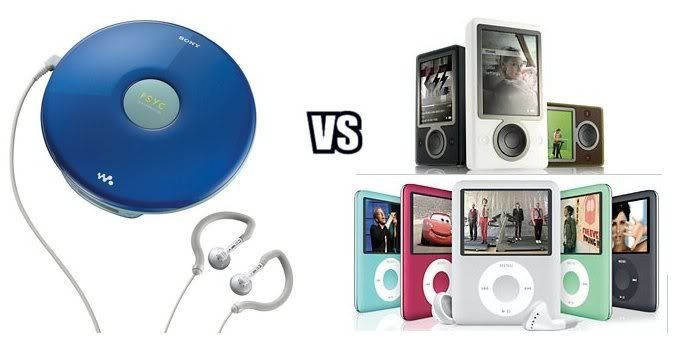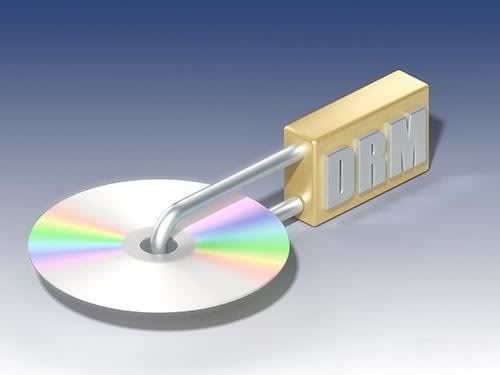Music - Physical vs. Digital Distribution

The increasing popularity of digital music services and devices such as Apple's iTunes player/store and iPod digital music player have raised questions about the decreasing relevance of physical album releases. Disc-based sales have been gradually going down as more record labels and independent artists embrace digital distribution methods. Pioneering bands such as Radiohead, Nine Inch Nails, and more recently Metallica offered consumers a variety of purchasing options and control over the price paid for the product.The enormous library that stores like iTunes and Amazon offer is amazing, with the majority of files lacking the restrictive DRM security measures that limits personal control over the music. Portability is a huge factor, with CD players fading out in favor of digital music players such as Microsoft's Zune or Apple's iPod. With piracy, DRM security, preference, convenience, and value each playing a role in music distribution, many interesting points can be made on each method and the future of the music industry.
The Impact of Piracy
The music industry has constantly been battling piracy since the early days of the Napster file sharing service. Artists like Metallica drummer Lars Ulrich are notoriously known for crusading against fans that pirate their music, which eventually forced Napster into a legitimate music store and other peer-to-peer file sharing services like Kazaa, LimeWire, and BitTorrent taking its place. The large movement towards digital music and the wider expanse of broadband internet has only compounded the issue. The availability of online digital music stores has helped alleviate the problem, but this has been gradually eating away at physical album sales. While piracy isn't as big of an issue with less tech-savvy consumers,
towards digital music and the wider expanse of broadband internet has only compounded the issue. The availability of online digital music stores has helped alleviate the problem, but this has been gradually eating away at physical album sales. While piracy isn't as big of an issue with less tech-savvy consumers,  the subsequent creation of digital music offerings has had a similar effect. Streaming video and music websites such as imeem, last.fm, Pandora, and YouTube have also shown the need for a new business model for the music industry. Record labels and indie artists need to build around online distribution to supplement physical distribution. Supporting services like last.fm and iTunes will hopefully diminish the desire for piracy and motivate consumers to purchase a physical or digital copy if the music warrants it.
the subsequent creation of digital music offerings has had a similar effect. Streaming video and music websites such as imeem, last.fm, Pandora, and YouTube have also shown the need for a new business model for the music industry. Record labels and indie artists need to build around online distribution to supplement physical distribution. Supporting services like last.fm and iTunes will hopefully diminish the desire for piracy and motivate consumers to purchase a physical or digital copy if the music warrants it.
The Restrictions of DRM
DRM stands for digital rights management and is a broad term to describe access control technology and measures companies take to limit the usage on media devices. Piracy sprung up from preventative action such as this, challenging media content holders for personal gain or mere principle. Although it sounds good in theory, DRM ends up being more restrictive than helpful.  It did not really catch on in audio CDS, although Sony BMG was involved in a large scandal and lawsuit over its DRM software and the installation of vulnerable rootkit virus on PCs. Its use on audio CDs have passed, but it more recently was a seemingly insurmountable issue with digitally released music. Almost every major digital music store offered music with their own DRM software, which limited the amount of devices it was compatible with and how many PCs you could put it on. Most of the music purchased on rivaling services were not cross-compatible. Only in the last couple years has the call for DRM-free music been answered. As increasing pressure was placed on digital music stores, major services like iTunes and Napster finally offered non-DRM music while others like eMusic and Amazon have been showing the success that can be had without these security measures.
It did not really catch on in audio CDS, although Sony BMG was involved in a large scandal and lawsuit over its DRM software and the installation of vulnerable rootkit virus on PCs. Its use on audio CDs have passed, but it more recently was a seemingly insurmountable issue with digitally released music. Almost every major digital music store offered music with their own DRM software, which limited the amount of devices it was compatible with and how many PCs you could put it on. Most of the music purchased on rivaling services were not cross-compatible. Only in the last couple years has the call for DRM-free music been answered. As increasing pressure was placed on digital music stores, major services like iTunes and Napster finally offered non-DRM music while others like eMusic and Amazon have been showing the success that can be had without these security measures.
Personal Preference and Convenience
With digital music players like iPods or Zunes becoming the de facto standard for listening and portability, handling a large amount of CDs becomes more of a hassle. Windows Media Player and iTunes are great examples of convenient music organization and storage tools. Having easy access to your entire music collection with just a few keystrokes is a huge benefit instead of switching out albums. Being able to more easily purchase a couple of songs or an entire album in your living room rather than going to a retail store is another benefit. However, there are still those that prefer owning physical copies of music. Having a tangible back-up is more reassurance and security in case of hard drive failure or a misplaced iPod. Owning the physical CD also creates a nice visual collection rather than merely browsing through a digital library. Personally, I think listening to each CD individually adds to the music experience and prevents distractions and temptation to constantly change track and artist.
The Value of Physical Albums
Although the price of physical albums may be more than purchasing a digital copy, it is not by much. For just a couple dollars more you could own the actual CD with artwork, liner notes, or bonus content.  While many artists host exclusive iTunes store tracks, they sometimes create special packaging or content with specific retail stores like Target or Best Buy. Tool's 2006 release, 10,000 Days was released with cardboard packaging and built-in stereoscopic glasses to view the booklet and artwork with the illusion of depth and three-dimensions. But oftentimes, the parity in physical and digital music pricing is too close. Owning the CD still allows the creation of digital copies in any desired format, although digital music is usually in the widespread mp3 format. Audio quality is usually superior on the physical album, but the gap is gradually decreasing.
While many artists host exclusive iTunes store tracks, they sometimes create special packaging or content with specific retail stores like Target or Best Buy. Tool's 2006 release, 10,000 Days was released with cardboard packaging and built-in stereoscopic glasses to view the booklet and artwork with the illusion of depth and three-dimensions. But oftentimes, the parity in physical and digital music pricing is too close. Owning the CD still allows the creation of digital copies in any desired format, although digital music is usually in the widespread mp3 format. Audio quality is usually superior on the physical album, but the gap is gradually decreasing.
Overall, the market is looking strong for both distribution methods. While some artists or labels may be slow to change from the old ways, many are coming around and embracing digital services and methods. Nine Inch Nails frontman Trent Reznor is a great example of this, becoming an independent artist and offering not only a wide span of distribution methods but free songs and entire albums to the public. Record companies take a large stake of the profts from artists, and digital distribution can be the answer to these problems for bands both large and small.


2 comments:
This is an excellent article, it sums up the situation very well. My personal preference is to have the physical item, but since I'm out of storage room for CDs the digital download alternative definitely has come in handy.
I personally prefer purchasing physical albums, especially since you get more value for about the same price. I have only recently started converting my CD collection into digital format, as I have preferred to listen to each album individually. But I have been storing my CDs into binders for easier cataloging and organizing.
Post a Comment